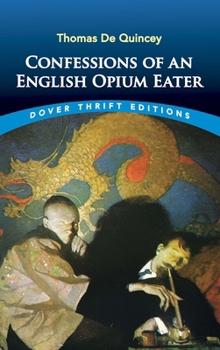Confessions of an English Opium Eater
Select Format
Select Condition 
Book Overview
Although he was an acute literary critic, a voluminous contributor to Blackwood's and other journals, and a perceptive writer on history, biography, and economics, Thomas De Quincey (1785-1859) is best known for his Confessions of an English Opium Eater.
First published in installments in the London Magazine in 1821, the work recounts De Quincey's early years as a precocious student of Greek, his flight from grammar school and subsequent adventures among the outcasts and prostitutes of London, studies at Oxford University and his introduction to opium in 1804 (he hoped that taking the drug would relieve a severe headache). It was the beginning of a long-term addiction to opium, whose effects on his mind are revealed in remarkably vivid descriptions of the dreams and visions he experienced while under its influence.
Describing the general style of the Confessions, an English critic of the period wrote in the London Monthly Review: "They have an air of reality and life; and they exhibit such strong graphic powers as to throw an interest and even a dignity round a subject which in less able hands might have been rendered a tissue of trifles and absurdities."
In later years, De Quincey revised and expanded the first edition of the Confessions into a much longer, more verbose work which lacked the readable intensity of the original. The present edition reprints the first version, generally considered more impressive, and admired for its introspective penetration and journalistic astuteness.






